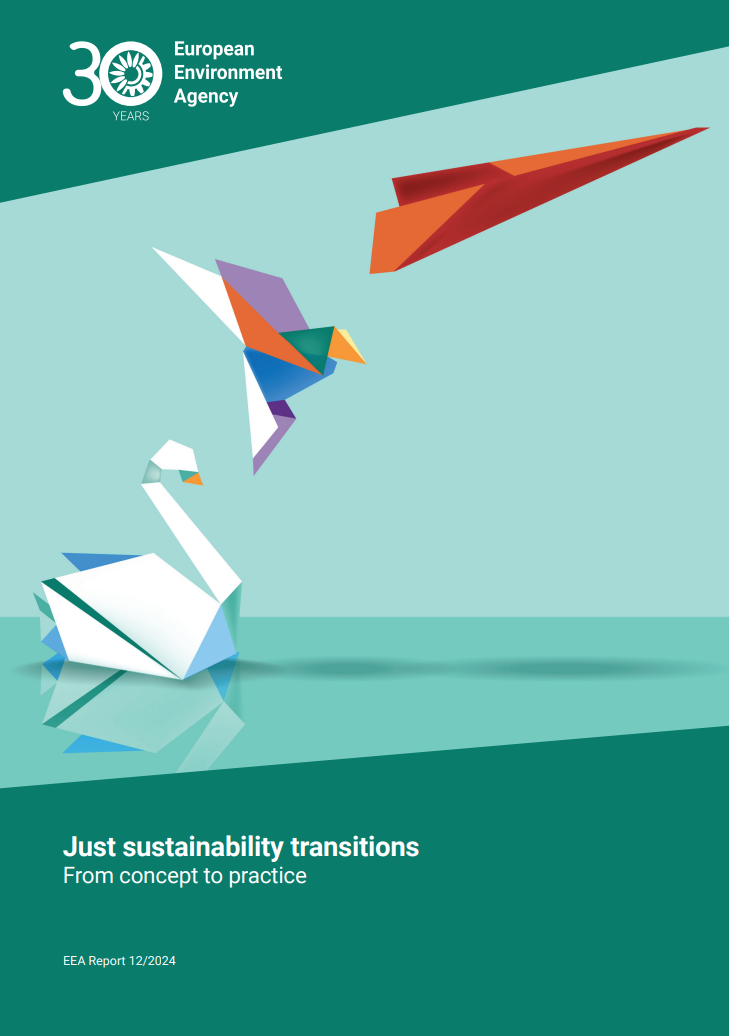All official European Union website addresses are in the europa.eu domain.
See all EU institutions and bodiesEEA Report 12/2024
This report considers how justice is tackled in the policies which are currently in place to deliver the European Green Deal. It summarises the lessons learnt for policy-makers seeking to achieve a fair green transition, by moving from the concept of justice to the practice of embedding fairness in the design and implementation of policies.
EN PDF: TH-01-24-008-EN-N - ISBN: 978-92-9480-684-0 - ISSN: 1977-8449 - doi: 10.2800/6238023
Key messages
- As Europe strives to reduce greenhouse gas emissions and decouple economic growth from resource use, certain social groups and European regions will be disproportionately affected. It is therefore critical to ensure that transitions are fair. A failure to do so risks exacerbating existing inequalities or even creating new ones, potentially leading to social divisions, discontent and resistance to change.
- Delivering justice in sustainability transitions requires policymakers to:
- identify and correct the regressive economic and social effects of climate and environment policies;
- address the unequal burden of environmental risks across society;
- ensure fair and inclusive participation in decision-making processes; and
- recognise the different values, identities and capacities of groups across society and ensure their access to democratic processes.
- Several policy measures and initiatives, in particular the Just Transition Mechanism and the Social Climate Fund, have been put forward with the explicit aim to support those territories and groups of the population that are most vulnerable to negative impacts of the green transition. There is potential to learn from good practice and strengthen approaches and mechanisms to better address justice in sustainability transitions.
- Achieving justice in sustainability transitions also requires recognition of the interconnectedness and complexity of the systems at play. A comprehensive and holistic policy framework that brings green transition policies together with employment, training and social policies, and integrates and coordinates policy objectives across key economic sectors, can better support a just transition. At the same time, delivering transitions that are fair demands careful consideration of the specificities, inequalities and challenges of the local context, and its interplay with larger geographical scales.
- To effectively implement just transition policies, it is essential to strengthen mechanisms that support capacity building within a multi-level governance framework. This involves empowering decision-makers at different levels of governance to mobilize resources, as well as enabling citizens to help shape policy processes and engage in the transition. Special emphasis and resources should be allocated to capacity building aimed at involving vulnerable and marginalised groups in the policy process.
- Social justice is an integral part of sustainability. Fostering just transitions requires the proactive development of sustainable systems; this can be achieved by promoting alternative practices that are both sustainable and accessible to all. For a policy mix to enable a just transition, policy instruments should address both just phase-out and build-up.
- A continuous commitment to assessing progress and refining policies is integral to delivering justice. Robust systems for monitoring, evaluating and adjusting policy based on evolving societal needs are needed.
Loading
Related contents
- EEA press release: Ensuring justice in Europe’s sustainability transition

